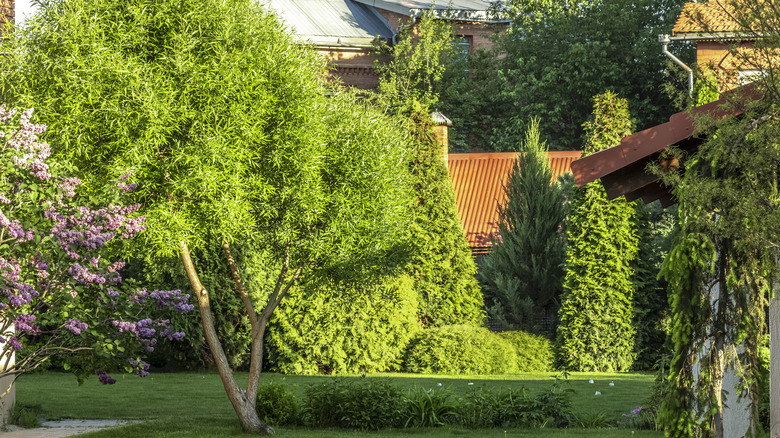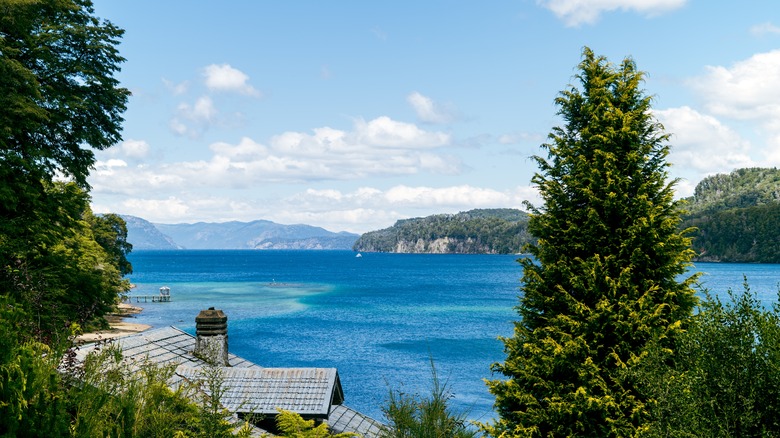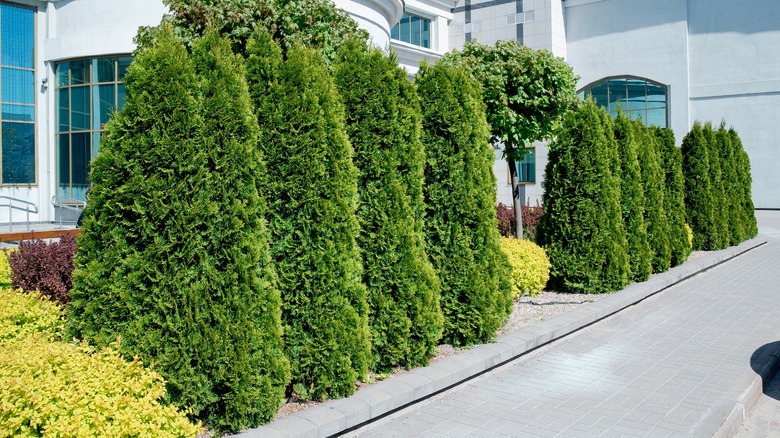Leyland Cypress Vs. Arborvitae: Which Privacy Tree Reigns Supreme?
If you're considering planting trees for privacy instead of installing a fence, you've likely come across recommendations for both Leyland cypress and arborvitae multiple times. Both have a reputation for being fast-growing trees to plant for privacy in your yard. They're also thought to be low maintenance, hardy, and ideal for creating a dense, year-round screen of evergreen foliage.
While both have become increasingly popular choices, neither are as problem-free as you might hope. Instead, each species comes with tradeoffs and criteria that may make it more or less suited to your yard. Leyland cypress is relatively drought tolerant but increasingly prone to pest and diseases, especially in wet conditions. So it's better planted on its own since a row of the same species can make disease outbreaks frequent and hard to control. Meanwhile, arborvitae isn't drought tolerant, but is less disease-prone and adapts to a wider variety of conditions. It can thrive in groups as a hedge, but it may be prone to damage if planted in dry or windy areas.
In the end, the privacy tree you pick comes down to the climate and soil in your region and whether or not you need a single tree or a row of them. If you aren't able to plant either tree in its ideal conditions, you also need to factor in how much and what kind of ongoing maintenance and care you're willing to commit to.
The Leyland cypress is best as a standalone privacy tree
The Leyland cypress (Hesperotropsis leylandii) is a hybrid of two different conifers, both of which are native to the United States. When young, it can grow as much as 3 feet per year, maxing out at about 50 feet tall. It prefers full sun, but tolerates some shade. As a privacy tree, it forms a tall, columnar shape that rarely needs pruning to keep tidy.
While those characteristics sound like a done deal, the species has become plagued with problems in recent years. It's become so popular and widespread that pests and diseases that were once rare are now becoming increasingly commonplace. That includes canker, root rot, and other serious diseases. Another major issue is bagworms, which can cause the tree to drop all of its foliage in a matter of weeks.
To reduce the risk of these problems, you should plant Leyland cypress in full sun and in well-drained soil. Then, make sure it's neither over-watered nor exposed to prolonged drought. Finally, plant it alone rather than in groupings to minimize the risk of disease spread. In short, the Leyland cypress is only a good choice for yards with optimal light and soil conditions and that only need a single tree to create privacy. It may also do better in hot, dry climates than arborvitae. You just might have to water it during periods of drought, since drought-stricken trees are more vulnerable to infection.
Arborvitae makes a better privacy hedge
The arborvitae or northern white-cedar (Thuja occidentalis) is another one of the most popular evergreen trees that give you privacy all year round. While some cultivars can grow as fast as 3 or 4 feet per year, the U.S.-native species overall is considered slow-growing compared to the Leyland cypress. It will reach a mature size of about 50 feet tall and 15 feet wide. Like the Leyland Cypress, it needs little pruning to maintain a tidy, pyramidal shape. This makes it a prime candidate for privacy hedges. You can plant trees as close as 5 feet apart and enjoy a dense privacy hedge within a few years.
Arborvitae is also fairly low-maintenance and hardy. While it's not immune to problems, it's far more resistant to disease and pests than Leyland cypress. The cold-hardy evergreen does well in zones 2 through 8 and even tolerates wet soil, part shade, and growing near juglone-producing species like black walnut.
Because it's less prone to disease and pests, arborvitae is the better choice for creating privacy hedges. It's also a better pick for colder and wetter climates. With that said, it prefers well-drained soil, full sun, humid air, and does best with protection from harsh winds. While arborvitae is hardy enough to adapt to imperfect conditions, the fewer of those criteria your yard can meet, the more it will struggle to grow into a lush, dense privacy screen.


